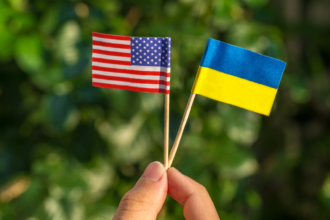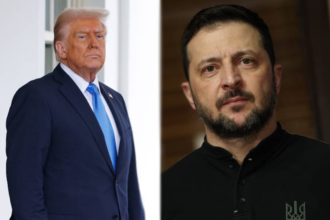Following three days of talks in Saudi Arabia, the war in Ukraine has advanced. Two separate texts were generated covering agreements between the United States and Russia and between the United States and Ukraine. Though there were some variations, both manuscripts had a few commonalities.
All sides agreed “to ensure safe navigation, eliminate the use of force, and prevent the usage of commercial vessels for military purposes in the Black Sea.” They also agreed “to develop measures for implementing… the agreement to ban strikes against energy facilities of Russia and Ukraine.” The Black Sea Truce was at the core of these discussions, inspiring expectations for regional stability.
If this deal is followed, tensions in an area where maritime conflicts have seriously threatened world trade and security might be much lowered. Russia and Ukraine mainly depend on the Black Sea for their exports—especially agricultural goods like wheat and fertilizers. A more durable peace process depends on ensuring safe navigation and stopping more attacks on critical infrastructure.
Still, the situation is complicated, given that both sides have ingrained mistrust of one another despite these pledges. The effective execution of this ceasefire depends on well-defined systems of enforcement and responsibility. Given that past attempts at ceasefires have often been fleeting, one of the main issues is how violations would be dealt with. The function of international monitoring organizations is essential in guaranteeing adherence.
How did Ukraine reply to the agreement?
Ukraine’s president, Volodymyr Zelensky, was only half happy with the result. He appreciated the progress achieved, but he was disappointed that strikes on civilian facilities were not explicitly banned.
“We welcome the commitments made to the Black Sea and energy ceasefires,” he said, attesting to Ukraine’s instant implementation of these clauses.
The Black Sea ceasefire offers Ukraine both possibilities and challenges. On the one hand, it may shield its coastal areas from more attacks, enabling crucial economic activity to start again. On the other hand, Ukraine is still cautious about Russia’s aims and whether Moscow will keep half of the agreement. Given that earlier ceasefires in this conflict have often been breached, the likelihood of violations is still great.
A further noteworthy accomplishment for Ukraine was a US pledge to “remain committed to helping achieve the exchange of prisoners of war, the release of civilian detainees, and the return of forcibly transferred Ukrainian children.” For Ukraine, this feature of the agreement is vital as allegations of thousands of Ukrainian children being forcibly moved to Russia have surfaced. Kyiv still prioritizes addressing these humanitarian issues.
How Did Russia Complicate the Agreement?
Shortly after these declarations, the Kremlin released a supplementary paper adding new requirements omitted from the original agreement between the United States and Russia. These factors complicated the road toward a Black Sea truce.
The Kremlin claims that the Black Sea truce would only be implemented if restrictions on Russian banks, insurers, businesses, ports, and ships were removed. These steps would help Russia export fertilizers and agricultural products more efficiently.
Russia essentially presented this contract as a means to destroy meaningful Western economic sanctions and revitalize the Black Sea Grain Initiative—an agreement it withdrew from in 2023.
This demand emphasizes Moscow’s general plan to exploit ceasefire discussions as a means of economic aid. Since the conflict began, Russia has had severe financial restrictions, which have affected its capacity for worldwide trading. Russia is trying to transform a military accord into an economic tool by linking the Black Sea truce to releasing sanctions.
Still, this requirement is dubious. Exceptionally, those implemented in line with the European Union and the United States alone might be unable to repeal sanctions unilaterally. For instance, Russia’s desire to rejoin the SWIFT financial system would need clearance from many foreign players. Given continuous tensions, getting such clearances may be challenging.
Will Sanctions Affect the Ceasefire’s Starting Date?
Russia’s other conditions provide significant obstacles. Lifting these penalties might take a lot of time and might not be under the United States’ only power. For instance, reversing Russia’s access to the SWIFT financial messaging system would require European Union consent, adding another level of complexity.
Moreover, the Kremlin said the 30-day energy stop would be retroactively implemented starting March 18. It further noted that should either side break the agreement, this Black Sea truce might be revoked.
Under these circumstances, the date of the ceasefire implementation remains unknown. Any advancement could be delayed if Russia breaks the agreement until sanctions are dropped. The longer these negotiations go on, the greater the chance of fresh Black Sea conflict.
Ukraine and her Western allies are still dubious about Russia’s aims. Moscow has sometimes utilized past accords as a tool of military regrouping while maintaining its strategic offensives elsewhere. Should the West give in to too rapid sanction easing, it risks giving Russia financial relief in little return.
Is this merely a tactical action or a step toward peace?
Even with the established accords, the situation remains delicate. Mutual mistrust is still hovering over the possibility of long-lasting peace. Though they represent a step toward lessening tensions, the most recent events fall short of the complete national truce the United States first demanded.
Ceasefires are sometimes viewed as processes rather than one-time events; this is also true here. The critical issue is whether all sides adhere to this agreement, guaranteeing its successful execution.
“The proof of the pudding will be in the eating,” an official said, stressing that actual observance of the Black Sea truce is more critical than mere declaration.
This agreement has several likely results. Under the best-case scenario, Russia and Ukraine keep their promises, which helps to progressively defuse the crisis and create conditions for more general peace discussions. This might open the path for more talks on economic reconstruction, prisoner swaps, and humanitarian concerns.
On the other hand, if any side breaks the deal, it might aggravate existing tensions and complicate diplomatic initiatives even more. Notably, Russia has a history of utilizing ceasefires strategically instead of as sincere peace-building actions. Should Moscow see this agreement as only a means of relieving economic pressure while keeping military operations elsewhere underway, the truce could rapidly fall apart.
Furthermore, foreign observers have noticed the Black Sea region’s strategic focus on countries other than Ukraine and Russia. NATO interests, Turkish ownership of essential channels, and more significant geopolitical concerns mean that any disturbance in this area could have far-reaching effects outside the local combat zone.
The fate of this agreement ultimately depends on whether the parties engaged in the search for a road to peace or if they are only purchasing time to keep pushing their advantages on the ground. The Black Sea ceasefire is a delicate but essential step toward which the community will be especially vigilant in the following weeks.








